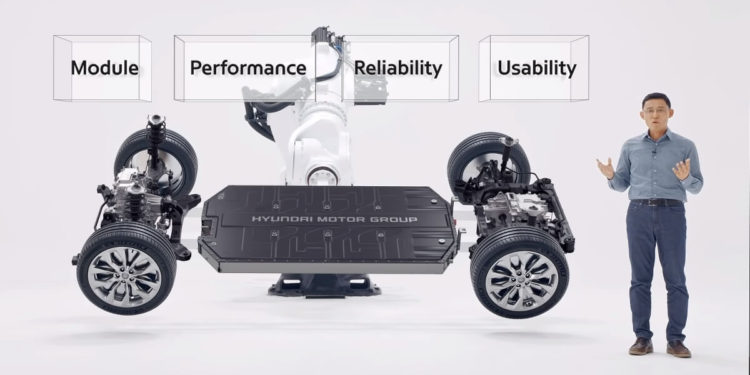Hyundai Motor introduced its new Electric-Global Modular Platform (E-GMP), which would serve as the principal technology for its next-generation electric vehicles, in a virtual press conference on Wednesday.
Hyundai stated that the battery electric vehicle (BEV) dedicated platform would improve and strengthen its range of new vehicles starting 2021. Hyundai’s Ioniq 5 and Kia Motor‘s first electric vehicle would receive the E-GMP upgrade along with the Genesis models.
Electric-Global Modular Platform (E-GMP)
Battery electric vehicles utilize the energy stored in rechargeable battery packs and contains no secondary source of propulsion. Vehicles produced via the E-GMP platform could sustain a 500-kilometer maximum driving range with a fully charged battery. The batteries run up to 100 kilometers after charging for five minutes and charge up to 80 percent in just 18 minutes.
The E-GMP provides many benefits for electric vehicles, like advanced development flexibility that could accommodate internal combustion engines.

Albert Biermann, president and Hyundai Motor Group R&D head said that the Kia BEVs and front-wheel-driven Hyundai aims to achieve the most efficient EVs in their sections. Hyundai’s rear-wheel driven based E-GMP would extend technological leadership to areas where customers demand excellent driving dynamics and outstanding efficiency.
According to Hyundai, a high-performance model based on E-GMP could accelerate from zero to 100 km/h with a top speed of 260 km/h in less than 3.5 seconds. For safety, the platform has adopted a battery support structure made of ultra-high strength steel.
Hyundai designed the E-GMP to improve the cornering performance and driving stability with optimal weight distribution between the front and rear of BEVs.
The platform’s design, such as the battery pack attached beneath the floor and the slim cockpit module, ensures a larger interior space. Platform standardization and modularization would also allow customized, rapid, and flexible development for BEVs.
Vision for Growth
The E-GMP would enable Hyundai to launch 23 battery-electric models and sell more than 1 million BEVs by 2025 worldwide. It would also optimize driving dynamics and safety while maximizing cabin space.
Hyundai would also utilize the E-GMP in its N-line cars and the high-powered versions for Kia and Genesis. It unveiled its EV brand IONIQ in August and intends to release the IONIQ 5, 6, and 7 by 2024. By 2025, Kia aims to grow its EV account sales by 20 percent.
In September, Kia announced plans to increase battery electric vehicles’ sales to 20 percent of by 2025. The company also recently published an early image of seven dedicated battery-electric models released sequentially by 2027.
Jung Jin-hwan, Hyundai’s head of electrification development, stated that the company plans to set up eight EV charging stations and 800-volt EV charging systems at 12 expressway rest stops. Every charging station would contain six charging systems and intends to increase the number of chargers eventually.







